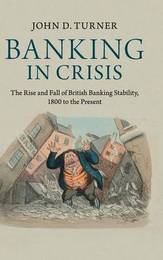
|
Banking in Crisis: The Rise and Fall of British Banking Stability, 1800 to the Present
Hardback
Main Details
| Title |
Banking in Crisis: The Rise and Fall of British Banking Stability, 1800 to the Present
|
| Authors and Contributors |
By (author) John D. Turner
|
| Series | Cambridge Studies in Economic History - Second Series |
|---|
| Physical Properties |
| Format:Hardback | | Pages:266 | | Dimensions(mm): Height 229,Width 152 |
|
| Category/Genre | Economic history
Banking |
|---|
| ISBN/Barcode |
9781107030947
|
| Classifications | Dewey:332.10941 |
|---|
| Audience | | Professional & Vocational | |
|---|
| Illustrations |
41 Tables, black and white; 10 Line drawings, unspecified
|
|
Publishing Details |
| Publisher |
Cambridge University Press
|
| Imprint |
Cambridge University Press
|
| Publication Date |
10 July 2014 |
| Publication Country |
United Kingdom
|
Description
Can the lessons of the past help us to prevent another banking collapse in the future? This is the first book to tell the story of the rise and fall of British banking stability over the past two centuries, shedding new light on why banking systems crash and on the factors underpinning banking stability. John Turner shows that there have only been two major banking crises in Britain during this time - the crises of 1825-6 and 2007-8. Although there were episodic bouts of instability in the interim, the banking system was crisis free. Why was the British banking system stable for such a long time? And, why did the British banking system implode in 2008? In answering these questions, the book explores the long-run evolution of bank regulation, the role of the Bank of England, bank rescues and the need to hold shareholders to account.
Author Biography
John D. Turner has been a Professor of Finance and Financial History at Queen's University Belfast since 2005. At the time of his appointment to his chair, he was one of the youngest full professors in Queen's University. He is the founder and director of the Queen's University Centre for Economic History. John Turner teaches money, banking and finance to undergraduate and postgraduate students. He is also an active blogger - he writes a blog (www.financelongrun.co.uk), aimed at his students and interested others, which centres on the past, present and future of finance. His research, which has been published in all the leading economic and business history journals, as well as economics journals, is focused on the long-run evolution and development of banking, banking crises, bubbles, corporate law, and financial markets. His research has been funded by the British Academy, Economic and Social Research Council, and the Leverhulme Trust. He has held several distinguished visiting positions during his career - he has been a Houblon-Norman Fellow at the Bank of England and an Alfred D. Chandler Fellow at Harvard Business School.
Reviews'Banking in Crisis combines the very best of serious academic scholarship and keen policy analysis. It should be required reading for anyone - expert and non-expert alike - who is interested in the past, present, and future of British banking.' Richard S. Grossman, Wesleyan University, Connecticut 'What makes for stable banking? Bankers are prone to gamble with depositors's money. What keeps them honest is a personal stake, or tight regulation. Turner shows that since 1825, stability required either the one or the other, and that relaxation of discipline, whatever its advantages, has placed the financial system at risk. The past worked for a long time, and the present doesn't.' Avner Offer, University of Oxford 'John Turner has done the community of banking scholars, regulators and policy makers a great service by writing an account of two centuries of British banking. It is timely, scholarly and most of all highly readable ... a must-read for students at all levels. Highly recommended.' Kent Matthews, Cardiff University 'This elegant history by John D. Turner of British joint-stock commercial banking spans the period of its birth after the country bank crisis of the 1820s to the moment of its own calamity in 2007-8 ... an excellent and stimulating addition to the literature. With so much historical detail in one place, I expect my copy will become well-thumbed.' Duncan Needham, English Historical Review 'In this book, Turner reviews over 200 years of British banking history. He observes that banking, an inherently risky business, enjoyed an extended period of only minor disturbances in Britain between the 1825-6 banking crisis and the 2006-7 financial breakdown. During the intervening period, six disturbances in British banking did occur, but based on data and criteria the author presents, these are judged to have been relatively minor. Turner then seeks to discover the underlying changes in institutional arrangements that account for the stable period and recent widespread financial instability. The book concludes with a recounting of lessons from the past applicable today and proposals for restoring financial stability. Summing up: recommended.' E. L. Whalen, Choice 'Turner has written a timely and admirable book, one that belongs on the shelf (or in the Kindle) of all financial historians, and all policymakers involved in formulating regulations for financial institutions.' Hugh Rockoff, Journal of Economic History
|